On page one Ellis Kaque (Kiowa) returned home and wrote back to tell of the negative reception he received when he tried to convince his Indian friends to live as white men and only believe in the Christian God. This page also had a letter from Dave Cheyenne on his Sunday school excursion to the Zoological Garden and his first encounter with…
1880-1889
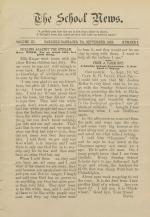
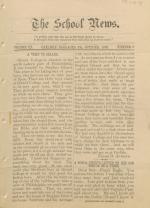
Page one had Frank D. Aveline wrote on visiting Girard College where he and other Carlisle students saw the Girard students do their drills, toured the founder’s house, and attended chapel. A Ponca chief also wrote a letter to his son Frank Eagle who was attending school at Carlisle. Page two mentioned the bi-centennial of William Penn making a…
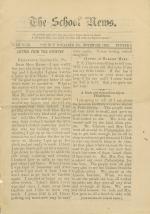
Page one opens with a letter from Hattie Mary to Miss Hyde, asking if she is lame again and if that is the reason she hasn’t been writing back. A letter from Minnie Atkins (Creek) also detailed the trip to California, which continued onto page four. She talked about staying at the Lincoln Institute. Page two had an editorial by Charles Kihega (…
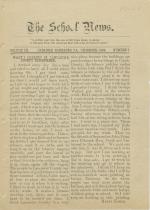
Page one featured Henry North's article about his outing during the summer in Lancaster County. North described his daily routine and explained what he learned. Page two had a piece about Christmas, in which all the students gathered in the chapel to meet with St. Nick. On the same page Calvin Red Wolf (Cheyenne) wrote to his father about his…
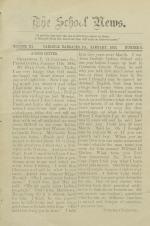
Page one was entirely taken up by a letter from Summer Riggs (Cheyenne), in which he discussed visiting friends and how a white man wanted to learn his actual name, Marchewa, in his native language. Page two mentioned issues that some Congressmen have with rules and conditions students at the school. There was also a letter from White Buffalo…
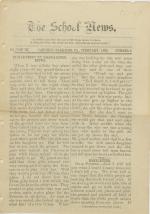
The first page had a story told to Joshua Given (Kiowa) by his grandparents about a young girl who never touched the ground and one day chased a star into the sky. It also included a letter from Louis Big Horse (Osage) to his father in which he discussed planting fruit. Page two had an article titled “What Indians Must Have” by paper editor…
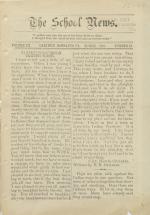
Page one included an address to the students from Capt. Daniel Childers, written by E. B. Childers, in which he described his own childhood and assured the students of the great opportunities they have as a result of attending Carlisle. Students were also reminded that chewing and smoking tobacco had to stop if they wanted to live like whites.…
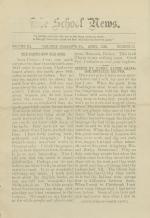
The first page had a letter from an unnamed student to his Uncle explaining that the world is round and moves at 1041 miles per hour. Harry Raven (Arapahoe) also discussed in a speech how the Government will not always care for the Indians and differences between whites and Native Americans. On page two Charles Kihega (Iowa) questioned if the…
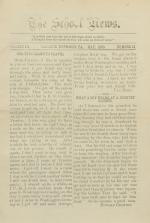
Page one reprinted Van Horn's letter to friend, in which he described his train ride into Trenton, New Jersey, and a drunken old man who disturbed him on the ride. Howard Chawhip also retold a story of an old drunkard who only went to church to hear the singing, but later became a good man after a fly caused him to uncover his ears during…
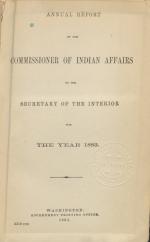
An excerpt from the Annual Report of the Commissioner of Indian Affairs to the Secretary of the Interior for the fiscal year ending 1883, containing the annual report of the Carlisle Indian School. The report provides a table of enrollment statistics, and has two addendums: one, a lengthy report by Principal C. M. Semple on the school's…
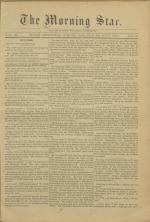
Page one is dominated by small vignettes of various day-to-day events that happened at the school, including compliments on students works, stories of gifted flowers and visiting agents. Page two has the beginning of an article titled “A Visit to the Indian Territory – Our Returned Pupils” which included a letter to Capt. R. H. Pratt. Page…
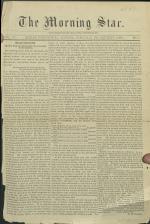
Page one opens with a letter from the Secretary of the Interior, H.M. Teller, about the education of Indians. Page two had the Address Captain Pratt gave at the National Educational Convention at Ocean Grove, NJ. This address continued on to page three. After the end of Captain Pratt’s address, page three has an article titled “It is Folly to…
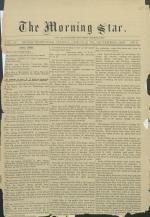
Page one had “Local Items” which consisted of small daily events such as the weather and games the students invented. Page two started with “A Plea for Greater Liberality in the Cause of Indian Education”, followed by “The People Responsible”, and “A Devoted Indian Missionary Dead”, which talked of the death of Dr. Stephen R. Riggs. Page three…
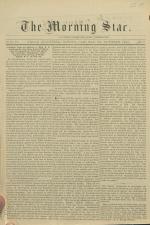
Page One had extracts from an address of Hon. B.G. Northrop Ex. Sec. State Board of Education of Connecticut. Page two had “Items of Interest From the Late Sioux Commission”, as well as a short piece on “What our Pupils in the Country Say.” Page three had short vignettes on various Local Items including returned students, weather and crops.…
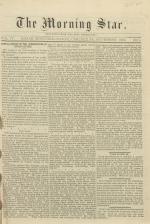
Page one opened with “Annual Report of the Commissioner of Indian Affair” which includes pieces on education, reports of the training schools. The page finished with a small letter to Miss Semple. Page two had Capt. Pratt’s account of his Western Trip, as well as information on the number of students at the school. Page three had the School…
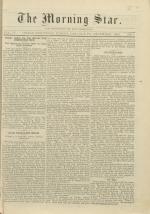
Page one opened with an article titled “Strong Words for the Indians From Commissioner Price”, along with “A Plea for Civilized Indians”, “Two Pueblo Boys”, and “The Baby”. Page two had Captain Pratt’s account of his visit to the west. It also had comments from various chiefs on their opinion on Carlisle. Finishing up the page were comments on…
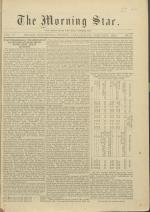
Page one opened with “What the Honorable, The Secretary of the Interior says his Annual Report About Indian Education”, which included statistics on treaties made with the various tribes. Page two had a piece called “ Hindrances and Helps” as well as a piece on young women helping to raise money for the school. Page three had a small bit about…
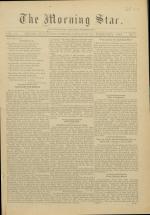
Page one opened with Proverb 11:23. Also on he page was “Educating The Indians”, and a Pueblo legend as told by a Pueblo student. Page two had story about a foolish farmer, as well as an important letter from an Indian Agent, and a piece on a conference at Lake Mohonk. Page three had the School Items which included Sunday services and the…
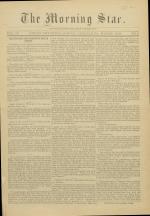
Page one opened with “The Thoughts and Opinions of Indian Agents” which took up the entire page an continued onto page four. Page two had an article on caring for Indians and small pieces on enforced education, and the need for books and paper for school. Page three had the school items, which mentioned things such as the death of Lizzie McNac…
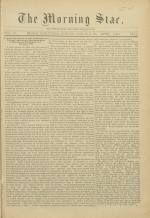
Page one had the speech Cap. Pratt gave at the National Convention of Superintendents of Education at Washington, D.C. He talked about how the solution to the “Indian Problem” was to give them all an education. Page two had an article on the relationship between the government and the Indian schools, as well as small pieces questioning who’s…
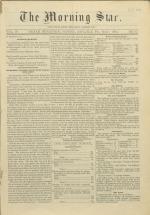
Page one began with a quick lesson on applied grammar, followed by “Secretary Teller’s views upon Indian Education and statistical information about the school, including student numbers, tribes attending and clothes in the sewing room. Page two had a call for more Indian schools to be made, as well as a an advertisement for $13,734 to…
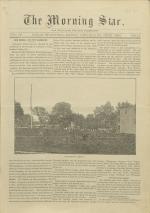
Page One had a photograph of the parade grounds on campus, as well as a bit of history on the Indian school. Page two had a small, horrifying piece on whether leaving Indians alone to die of illness or physically murdering them is more humane. The page also had extracts from the Address of Gen. George Crooks to the graduating class. Page three…
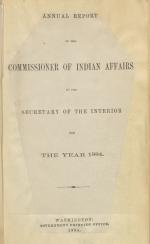
An excerpt from the Annual Report of the Commissioner of Indian Affairs to the Secretary of the Interior for the fiscal year ending 1884, containing the annual report of the Carlisle Indian School. The report includes discussions of enrollment statistics, transfers, educational and industrial progress, student health, the school farm, donations…
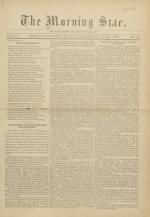
Page one had a poem titled “The Law of Liberty” followed by an article titled “The Republic in a Death Struggle with Ignorance” and comparison between the African and the Indian problem. Page two asked who was responsible for Indians having not fully “Christianized” and become “civil” and an article on the demoralizing old policy and how it has…
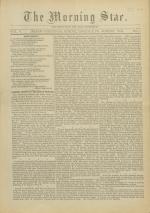
Page one opened with a poem on the Sioux, followed by a report on the “Present Aspects of the Indian Problem”. Page two asked “Who is responsible” for civilizing Indians as well as a small piece on an Australian who visited to learn about the Indians.
Page three had a continuation of the Australian visitor as well as several letters…
